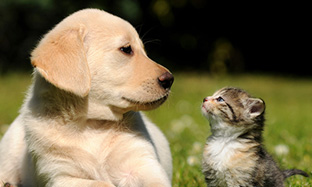
What type of nutrition to choose for my sterilized dog or cat?
In France, 83% of male cats and 78% of female cats are sterilized. The percentages are of 51% for female dogs and 25% for male dogs*. Beware, sterilization can predispose your pet to weight gain, notably by an increase in appetite !
To avoid a weight gain that may be very rapid after sterilization, it is important to modify the diet of your pet. Overweight has consequences on the health of the dog and cat and it is better to avoid it than have to make your pet lose weight !
The quantity of food to be given each day is based on the weight of the cat / dog. Ask your vet to help you estimate your pet’s ideal weight (reached at the age of 1 year old on average) and to calculate his daily ration.
Using the ideal weight to calculate the quantity of daily food is essential. If your neutered cat / dog has already gained weight and that you evaluate his ration based on this new weight, you will give him more food than necessary and he risks to continue gaining weight ! On the other hand, if you use the actual weight of a skinny pet, he will never reach a healthy weight.
Fats are the nutrients that are the most rich in calories: it is the first nutrient to 'cut off' to decrease the energy level of a ration. Without completely depriving the cat / dog of fats (fatty acids are essential for the skin’s health and the coat’s beauty), moderation is necessary!
Amino acids from proteins are absorbed more slowly than sugars of fats. A diet rich in protein therefore satiates a pet faster.
A high amount of protein helps maintain muscle mass instead of encouraging the storage of unwanted fat. It is easier to control the weight of a well-muscled pet because muscles consume more energy than the adipose tissue (the fat).
* rapport d’analyse de la FACCO (2016)

